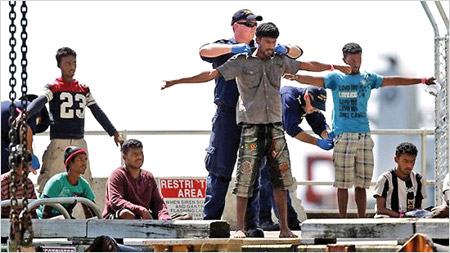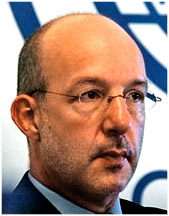Illegal migrants exposed to grave danger - IOM
By Dhaneshi Yatawara
A job with a good salary pack always works as a magnet anywhere in
the world. Today it is the key reason for global migration. According to
the United Nation's International Organisation for Migration, the total
number of international migrants has increased from an estimated 150
million in 2000 to 214 million persons in 2010. Migrated worker becomes
a key foreign exchange earner for many developing countries.
|

Asylum seekers being checked out |
|

Richard Danziger |
In a heavily migrating world Sri Lanka is no exception. According to
the data available with the Sri Lanka Bureau of Foreign Employment,
foreign exchange earnings in 2010 shows that migrant workers from Middle
East countries remitted 279,688 Million Rupees out of total private
remittances which was 60.10 percent of the total. Most of the time
migration happens due to the necessity of making a good living. And many
low income families, especially in the developing world, have fewer
opportunities to seek better opportunities in foreign lands through
legal migration as they cannot afford a legal process. People's dreams
of a better life would lead them to take whatever path possible to
achieve it - specially when nailed against the wall. This tendency has
led to illegal migration which has become a life threatening stage at
present.
In proper terms it is irregular migration rather illegal. In the Sri
Lankan situation we hear hundreds of people leaving to Australia, Canada
and many developed countries seeking a better life.
There are different reasons for a person to leave the country -
either legally or illegally. Certainly there are forced migrants - that
can be refugees fleeing prosecution, it could be people leaving for
environment reasons. And the main reason all over the world is lack of
economic opportunities in their countries. Sri Lanka is not different
from the world situation, said Chief of Mission of the International
Organisation for Migration (IOM) Richard Danziger.
We have a lot of people leaving Sri Lanka looking for better
opportunities offshore. Is there a difference in the recent past?
"We do see an increase in irregular migration," said the Mission
Chief. "A number of boats have transported people to Australia. And in
addition, since last year, we have seen many getting stranded in West
African countries who were largely on their way to Canada. Based on our
conversation with those who returned, it was mainly about economic
opportunities," Danziger said.
According to Danziger there were people from all over the country and
there was no demarcation of ethnicity or region - there were Tamil,
Sinhala, Muslim people from the north, south, east or west parts of the
country.
"Yet, even though we say that people irregularly migrate to other
countries mostly looking for better economic opportunities, we have to
look into each and every case of these individuals. We must listen to
what they have to say as well," he said.
The fact is that Sri Lanka is in a better shape than many of her
neighbours, said Danziger, 'but the opportunities are not spread equally
throughout the society and regions."
So the attraction to go looking for greener pastures exists in the
society. Be it the person in the southern part of the country or the
northern part, life is not easy, Danziger said. "They want to find a way
to make life better for their families," he said.
"Sri Lanka is an island so there is a large fishing community, thus
boats and seafaring expertise are there.
Since the end of the conflict there are no security restrictions
anywhere in the coast. It is easier to leave the country illegally and
of course a lot cheaper. With the information we gathered from the
people, around Rs. 200,000, without any down payment is enough to get to
Australia, which is quite cheaper than regular migration. There could be
less expensive means but this is a fact we heard directly from the
people who tried to migrate irregularly," he said.
Australia is not the only destination for these irregular migrants.
Since late 2011 the IOM had facilitated hundreds of Sri Lankans who were
stranded in many West African countries. "In a year we at the IOM
assisted about 550 people to return to Sri Lanka voluntarily from
countries in the West African region," Danziger said explaining the new
trend in Sri Lankan illegal emigration scenario.
"We assist and assess people who return voluntarily. We have assisted
around 80 people who returned from Australia, and a few from Europe. We
do not assist any of those who are removed forcefully. We have strict
rules in IOM that we cannot get involved," he said. As he explained, a
lot of the people who come back especially from Europe are largely due
to over-stay in visa. They are people who went there perfectly legally
and stayed longer than their visa, be it a holiday, tourist, business or
student visa. Some of these people return voluntarily. An asylum given
cannot be taken back from a Government unless it is given temporarily
due to a reason, such as an on going conflict.
Educating people
We are trying to educate people not to take the risk and migrate
illegally, he said. But convincing the people is very difficult. They
may see 99 cases of failures in their neighbourhood but still they would
like to highlight on one successful case. People prefer to look at the
lesser number of success stories, according to Danziger.
"We try to go through the community leaders, like a president of a
fishing society, religious leaders or any other leading figures of a
community. It is not a matter of scaring people, but we follow one on
one discussion with people in order to really convince that it is not
worth to take the risk," he said.
Yet, according to him people return with a question asking what is
the solution you have. "Their question is what the solution to their
problem is. People with a spirit for such an adventurous venture would
definitely take the attempt to migrate illegally.
But none of these conditions are unique to Sri Lanka. "When I was
once working in Indonesia a boat met with an accident with 450 people on
board, and 43 survived. The survivors have spent two days on water
clinging to wreckage. When they were brought to the land the Indonesian
Authorities requested our assistance and when we talked to these people
half of them were ready to get back on the next boat even after such an
experience. Because they say that it would not happen to them again. It
is the way people think anywhere in this world," he said adding his
experience gathered in several other countries.
Australia's visa system provides a screening mechanism for preventing
the entry of people who are identified as posing a security, criminal or
health risk, while facilitating the travel of genuine travellers.
As mentioned in their Immigration Department website, Australia's
border management system is based on a number of 'layers'.
The universal visa system (with alert checking), the airline liaison
officers network, the Advance Passenger Processing system (APP), which
operates at check-in overseas, the processing at Australian airports and
seaports on arrival. Leading-edge technology is used to deliver these
secure immigration processing systems. Anyone wanting to travel to,
enter or remain in Australia will undergo checks at each of these
layers, many of which are unobtrusive.
To safeguard the regular Sri Lankan migratory worker, the Government
has taken numerous steps.
Many of those who migrate illegally are for unskilled labour of the
destination. "We see that the Government through the Ministry of Foreign
Employment Promotion and Welfare has taken a number of steps to promote
regular migration of skilled workers, which supports discouraging
illegal migration," the IOM Chief said.
A number of Sri Lankans who were employed outside Sri Lanka rapidly
increased after the decision was taken at the Non Aligned Conference in
1976 to grant more job opportunities that were available in the Middle
East region, to Asian countries, which had a labour surplus. This
initiative was strengthened subsequently as a result of introducing
liberalised economic policies to the country in 1977. Since then the
number of labourers proceeded for foreign employment increased
gradually.
Thus, a strong mechanism was established in the country to regularise
and protect the migrating worker. Under the Sri Lanka Bureau of Foreign
Employment Act No. 21 of 1985, it is a legal requirement for all workers
leaving Sri Lanka for overseas employment to be registered with the Sri
Lanka Bureau of Foreign Employment prior to departure.
It not only protects the migrator but insures their jobs as well as
their families. When one obtains the registration licence of the Sri
Lanka Bureau of Foreign Employment, it provides that person with many
privileges, the most important being the job security and the life
insurance that one get through this. Some of the benefits include
housing loans, loans for self-employment, scholarships and support for
the education of school-going-children of these people. Today the world
has identified the benefits of people migrating for work and has been
making safety networks covering all countries.
It has been well recognised the importance of strengthening
international cooperation on international migration bilaterally,
regionally and globally. On December 18, 1990, the UN General Assembly
had adopted the International Convention on the Protection of the Rights
of All Migrant Workers and Members of their families. The 132 Member
States that participated in the General Assembly's High-level Dialogue
on International Migration and Development mid September 2006 reaffirmed
a number of key messages. It highlighted that international migration
was a growing phenomenon and that it could make a positive contribution
to development in countries of origin and countries of destination
provided that it was supported by the right policies.
Illegal migrants do not enter this safe environment the present world
has built. Unauthorised immigrants may expose themselves and citizens of
the nations they encroach upon to dangers while engaged in illegal entry
into another country.
Apart from the possibility that they may be intercepted and deported,
some considerably more dangerous outcomes have been known to result from
their activity. For example, unauthorised immigrants may be trafficked
for exploitation including sexual exploitation and some unauthorised
immigrants are involved in broader criminal activity. This has been the
world trend. People, who leave illegally, though they have committed an
immigration offence, certainly are victims of smugglers. The smugglers
are the real criminals. The IOM is trying to get the message across to
people that it is not worth the risk, according to Denziger.
"There is a big chance of being caught by the Sri Lanka Navy. There
is a decent chance of accidents especially with the monsoon weather. And
when people get to Cocos Island or Christmas Island in Australia, now
the chance of actually getting into the mainland, even getting temporary
measures to revive, are almost zero," Danziger said. "These people are
being misled by the agents or smugglers. And definitely the smugglers
need to be arrested and prosecuted because they mislead and use others
and put the lives of fellow human beings in danger. Really this is a
criminal activity," he said.
|



